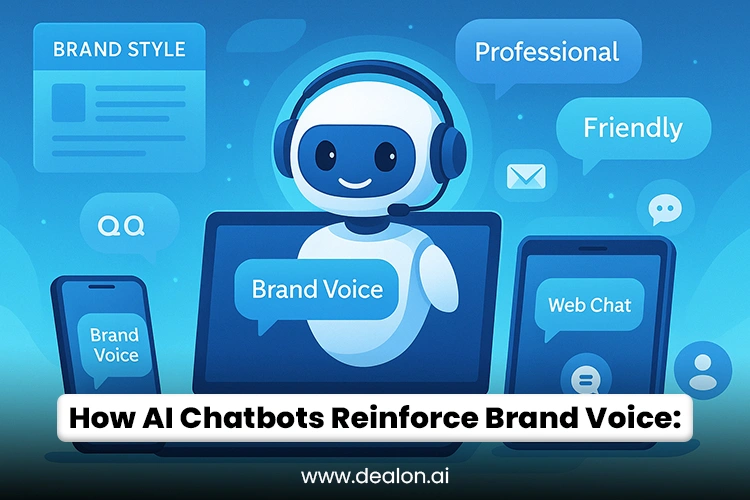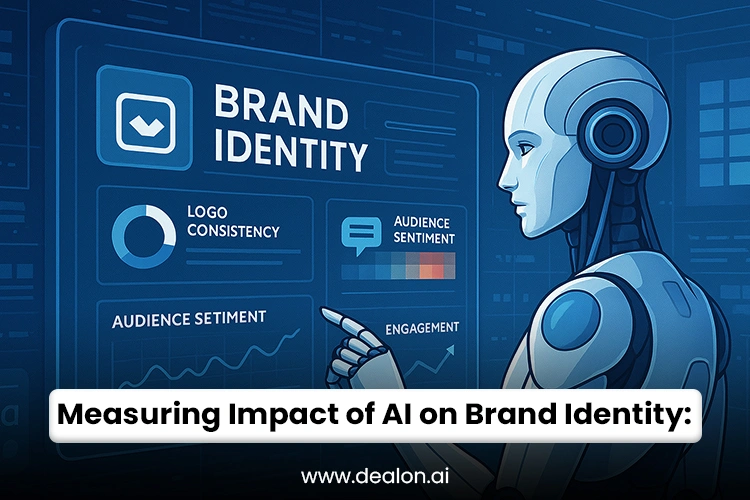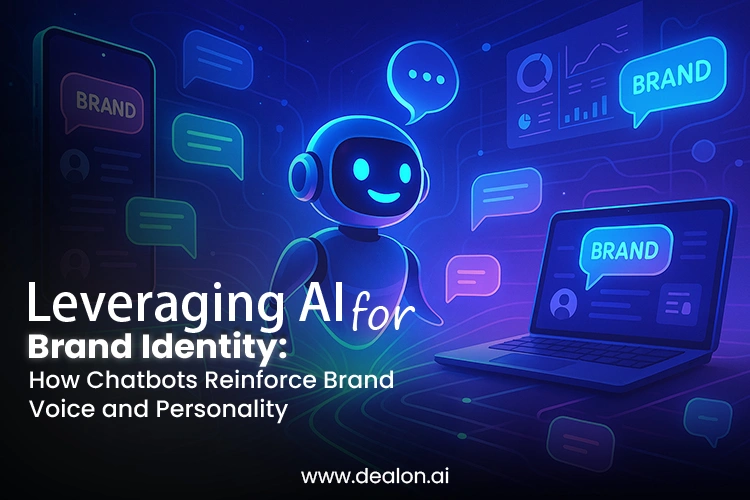In an era of digital transformation, businesses relentlessly pursue novel methods to solidify and amplify their brand identity. Among the most groundbreaking advancements is the integration of artificial intelligence (AI), mainly through AI-driven chatbots. These virtual assistants have evolved from essential query responders to dynamic agents embodying a brand’s voice, personality, and ethos. As customer expectations escalate, brands must adopt tools that facilitate seamless communication and serve as authentic extensions of their identity.
The Significance of Brand Identity in Achieving Business Success
Brand identity has become a cornerstone of business strategy in the ever-competitive and rapidly evolving marketplace. This multifaceted concept encapsulates a brand’s visual design elements, tone of voice, messaging, values, and overall customer experience. When meticulously crafted, brand identity is the foundation for lasting customer relationships, loyalty, and long-term business success.
At its core, brand identity is about differentiation. In a world where consumer choices are abundant, businesses must establish an identity that resonates emotionally with their target audience. This identity must reflect the company’s values and align with its consumers’ aspirations and desires. A distinct and compelling brand identity captures attention, builds trust, and ensures a business stands out amidst competitors. Whether it’s a bold and innovative tech startup or a heritage-driven luxury brand, how a company presents itself to the world plays a significant role in shaping its future.
The first element of brand identity is the visual aspect, which includes logos, color palettes, typography, and imagery. These components are the immediate recognition points for consumers. A logo, for example, represents a company’s ethos, encapsulating its story and mission in a single visual. Think of the bold simplicity of Apple’s apple or the distinctiveness of Nike’s swoosh—these symbols are ingrained in the consumer’s subconscious, evoking instant recognition and a sense of trust.
Beyond visual elements, a brand’s tone of voice is equally critical in conveying its personality. Whether a brand communicates in a formal, conversational, or playful tone, this voice must be consistent across all touchpoints, from marketing materials to customer service interactions. The tone of voice can evoke emotions that connect the brand to consumers on a deeper, more personal level. For instance, a wellness brand may adopt a calm, reassuring tone, while a tech startup may use a more energetic and innovative voice.
Equally important is the emotional connection a brand fosters with its audience. In an age where consumers increasingly seek brands that align with their values, an authentic brand identity—one that reflects integrity, transparency, and purpose—becomes pivotal. Brands that successfully cultivate this emotional connection create loyal customers who return and actively advocate for the brand.
The creation of a cohesive brand identity is an ongoing, strategic endeavor. It’s not just about aesthetics or clever messaging; it’s about building a personality that resonates with customers emotionally. This approach is essential in fostering trust and long-term relationships. Successful brands can maintain consistency in their identity across all touchpoints while adapting to changing consumer needs and market trends.
Ultimately, a well-defined and authentic brand identity provides a clear roadmap for businesses, helping them navigate the complexities of the marketplace. It establishes credibility, enables enterprises to command attention in saturated markets, and cultivates a loyal customer base that champions the brand. As companies continue to evolve, the strength and clarity of their brand identity will remain one of the most important factors determining their success.
Also Read: 7 AI Tools for Enhancing Blog Content Optimization
Chatbots: The New Frontier in Brand Communication

In the digital age, AI-powered chatbots have emerged as a transformative force in brand communication. What began as simple tools for answering frequently asked questions has evolved into sophisticated systems capable of delivering highly personalized and meaningful interactions. By utilizing the power of NLP and machine learning, chatbots can now interpret human emotions, preferences, and context, responding in ways that feel both intuitive and relevant.
One of the most potent aspects of AI chatbots is their capacity to mimic human-like conversations, providing an interactive experience that transcends mere transactional exchanges. Through the strategic implementation of chatbots, companies can maintain a continuous dialogue with customers, offering 24/7 support, personalized recommendations, and real-time problem-solving. The result is not only a more efficient communication channel but also one that reinforces the brand’s core identity and values. Whether it’s a friendly, casual tone or a formal, authoritative voice, chatbots can be customized to align seamlessly with the brand’s persona, ensuring a consistent and authentic experience across all touchpoints.
Integrating AI chatbots goes beyond enhancing efficiency—it represents a critical shift in how brands engage with consumers. In today’s market, where personalization is paramount, customers expect more than just generic responses; they seek interactions that reflect their needs and preferences. Chatbots, powered by advanced AI, excel in delivering this level of customization. By analyzing previous conversations, browsing history, and user inputs, these systems can tailor responses that feel deeply personal and highly relevant.
Furthermore, chatbots can maintain the integrity of a brand’s voice by delivering consistent, on-brand messaging, regardless of the communication channel. This consistency is essential in reinforcing a brand’s identity and cultivating customer trust. Whether a chatbot responds via a website, social media platform, or mobile app, it functions as an extension of the brand, representing its values and tone even when humans are not directly involved. For instance, a high-end luxury brand might program its chatbot to maintain an air of exclusivity and sophistication. In contrast, a casual lifestyle brand might choose an upbeat and conversational tone.
In addition to reinforcing brand voice, AI chatbots can enhance the overall customer experience by responding quickly and efficiently to inquiries. With the capacity to comprehend and interpret natural language, these systems can immediately solve customer problems, preventing frustration and fostering loyalty. Moreover, the integration of chatbots can increase brand accessibility, ensuring that customers from different time zones or with varying schedules can constantly interact with the brand at their convenience.
How AI Chatbots Reinforce Brand Voice

In today’s hyper-competitive market, brand voice is the cornerstone of a company’s identity, reflecting its values, ethos, and relationship with its audience. It’s not simply about the words used but the underlying tone, style, and personality conveyed in every interaction. Whether formal, casual, humorous, or empathetic, brand voice shapes customer perceptions and fosters deeper connections. AI-powered chatbots are uniquely positioned to reinforce this brand voice, offering businesses a scalable, consistent, and personalized communication tool that ensures every interaction aligns with the company’s identity.
AI chatbots are highly effective at providing hyper-personalized experiences, dynamically adjusting their tone and language to align with each user’s unique preferences and communication style. Chatbots can tailor bespoke responses by leveraging customer data, including past interactions, browsing history, and behavioral patterns, while aligning with the brand identity.
For instance, a brand that embodies warmth and approachability can program its chatbot to use friendly and conversational language, making users feel like they are interacting with a trusted friend. Conversely, a high-end luxury brand may opt for a more refined, sophisticated tone, ensuring that every chatbot response maintains the brand’s elevated image. This ability to personalize interactions at scale creates a dynamic and engaging experience that feels individualized yet always authentic to the brand’s core voice.
One of the most significant challenges brands face is maintaining consistency across all customer touchpoints. In a fragmented digital landscape where interactions occur on websites, social media platforms, mobile apps, and customer support channels, it is crucial to ensure that a brand’s voice remains steady and recognizable. AI chatbots are essential for maintaining consistent tone, language, and style across multiple platforms, ensuring cohesive and unified brand communication.
This consistency strengthens the brand’s identity, builds trust, and guarantees customers a cohesive experience no matter where or how they interact. Whether a user is asking a simple product question or seeking technical support, the chatbot’s responses will feel like a seamless extension of the brand’s personality, reinforcing its core values.
For example, a chatbot for a wellness brand can respond empathetically to users seeking support, offering comforting and reassuring language that reflects the brand’s commitment to care and support. On the other hand, a technology brand might program its chatbot to use efficient, precise language that mirrors the company’s values of innovation and professionalism. This emotional resonance is key to reinforcing a brand’s identity, as it ensures that customers feel understood and valued at every interaction.
AI chatbots are more than just tools for improving customer service; they are instrumental in bringing a brand’s voice to life across digital interactions. Chatbots maintain the integrity of a brand’s identity and enhance the customer experience by ensuring personalization at scale, consistency across touchpoints, and emotional resonance. In a world where every interaction matters, these intelligent systems are helping brands create more meaningful, impactful relationships with their audience, reinforcing their voice in once-impossible ways.
Building Brand Personality Through Interactive Engagement
In the digital age, a brand’s personality has become a crucial differentiator in the race for consumer loyalty. While products and services may be similar across competing brands, a brand’s personality—its tone, demeanor, and overall identity—can make or break customer relationships. Consumers are increasingly drawn to brands they can relate to, those that speak to their values and authentically address their needs. By leveraging AI chatbots as an extension of their brand identity, businesses can cultivate a dynamic and engaging personality that resonates with customers more profoundly, fostering long-term loyalty and trust.
In contrast, a more refined luxury brand could opt for a sophisticated and elegant conversational tone to maintain its high-end image. Regardless of the approach, chatbots create opportunities for brands to build emotional connections with customers, making them feel like they are interacting with a brand that truly understands them. The more emotionally invested customers become in these interactions, the more likely they will form lasting bonds with the brand.
Another innovative feature of AI chatbots is their ability to drive proactive customer engagement, initiating conversations rather than merely responding to queries. For instance, on an e-commerce platform, a chatbot can analyze user browsing behavior, offer personalized product recommendations, address potential concerns, or even extend a discount to encourage a purchase.
These proactive touchpoints enhance the overall customer experience and reinforce the brand’s personality by tailoring the conversation to meet the needs of individual users. By offering value-added interactions that feel personal and insightful, AI chatbots help brands appear more attentive, approachable, and attuned to customer needs, further solidifying their identity as consumer-focused and customer-centric.
One of the most striking advantages of AI chatbots is their ability to humanize digital interactions. Customers appreciate the opportunity to engage with authentic and personable brands in a landscape increasingly dominated by automated services and self-service technologies. AI chatbots can simulate a conversational tone miming human interaction, making customers feel engaged with a real person rather than a faceless algorithm.
By carefully programming these chatbots to maintain a friendly, relatable demeanor, businesses can create an experience that fosters a sense of belonging and empathy among users. Whether providing a thoughtful response to a product query or offering support during a challenging situation, chatbots can cultivate human connection, making customers feel heard and valued.
Measuring the Impact of AI on Brand Identity

In the modern business landscape, integrating AI-powered chatbots extends beyond enhancing customer communication—it plays a pivotal role in shaping, refining, and reinforcing a brand’s identity. As businesses increasingly turn to AI-driven interactions, the key to leveraging chatbots effectively lies in measuring their impact on the brand’s voice and persona. Companies can assess how well their AI chatbots align with and amplify their intended brand identity by closely monitoring specific metrics such as customer satisfaction, engagement rates, and brand perception.
One of the most direct ways to evaluate the effectiveness of AI chatbots in reinforcing brand identity is through customer satisfaction metrics. These metrics offer invaluable insights into whether the chatbot’s interactions meet customer expectations while staying true to the brand’s core values. For example, if a chatbot is programmed to reflect a friendly and approachable tone, tracking satisfaction levels can reveal how well this tone resonates with customers. High satisfaction scores and positive sentiment towards the chatbot’s demeanor signify that the chatbot is effectively mirroring the brand’s personality.
Engagement rates—such as the number of interactions, average response time, and follow-up conversations—are also critical indicators of chatbot success. Increased engagement often reflects that the chatbot sparks meaningful, value-driven customer interactions. Suppose a chatbot can initiate conversations that feel relevant and resonate emotionally. In that case, engagement metrics will likely be higher, indicating that the chatbot builds a stronger connection with users and reinforces the brand’s personality.
Another essential element in measuring the success of AI chatbots in reinforcing brand identity is evaluating brand perception. This involves gathering insights into customers’ perceptions of the brand’s voice, tone, and overall persona based on their interactions with the chatbot. Through sentiment analysis and feedback surveys, businesses can measure whether customers feel the chatbot’s responses align with the brand’s values. For example, suppose a wellness brand seeks to project a compassionate and supportive identity. In that case, customer feedback can determine whether the chatbot successfully conveys empathy and care during conversations.
By leveraging data-driven insights, companies can fine-tune the chatbot’s language, tone, and overall communication style to ensure that it consistently aligns with the evolving trajectory of their brand identity. Whether it’s refining the chatbot’s sense of humor, adopting a more professional tone, or enhancing its ability to resolve customer issues more efficiently, AI chatbots offer a dynamic, iterative tool for ongoing brand development.
Conclusion
Leveraging AI-powered chatbots is a transformative strategy for businesses seeking to reinforce and elevate their brand identity. From shaping brand voice to fostering emotional connections, chatbots are dynamic extensions of a company’s personality, enabling consistent and personalized communication across multiple touchpoints. Businesses can humanize digital interactions and build stronger customer relationships by carefully programming chatbots to reflect the tone, language, and style that align with their brand’s values.
The integration of AI chatbots also allows for continuous improvement, with real-time data analytics offering businesses the insights necessary to refine their chatbot’s responses and adjust to shifting customer expectations. Companies can ensure that their chatbots effectively reinforce their brand identity by measuring key metrics such as customer satisfaction, engagement, and brand perception. Furthermore, proactive engagement and memorable interactions facilitated by chatbots help solidify long-term customer loyalty.

